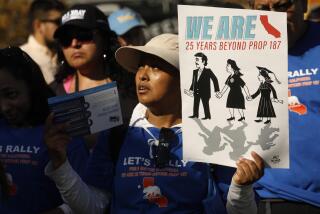Identity Crisis in the INS : Policeman or welcome wagon? Eventually, Congress must give an answer
The Immigration and Naturalization Service has long labored to fulfill two missions that are, in a practical sense, contradictory. It is at once charged with deterring illegal immigration and with shepherding legal arrivals into American citizenship through naturalization.
This dichotomy intensified in 1986 when Congress passed the Immigration Control and Reform Act. That law conferred amnesty on millions of immigrants who had come in without documentation or overstayed their tourist visas. For a time, the INS turned from hunting them down as criminals for deportation to guiding them onto the path to becoming American citizens. Once the amnesty expired, however, the INS was back to hunting unwanted intruders.
The difficulty of serving such divergent goals has now become painfully apparent. When California voters last year passed Proposition 187 to deny state health and other benefits to illegal immigrants and their children, they sent a powerful message to the immigration service that it should beef up border controls. And recent efforts in Congress to deny certain government benefits even to legal immigrants sent a message to long-term residents who have never taken citizenship and to those newly granted amnesty that they better seek citizenship fast.
The result has been a huge backlog that the beleaguered INS has been unable to process. According to the Latino Issues Forum, the agency has nowhere near the resources needed to process the 900,000 citizenship applications expected this year.
INS offices in Los Angeles, New York, Houston, Miami and other cities have long backlogs. Sometimes there is a year or more between application and citizenship. The Latino forum contends that, compared to its naturalization functions, the INS is devoting too much of its budget to enforcement.
Nearly all agree that illegal entries must be reduced and border controls enhanced. But if we want to bring the thousands of immigrants in Southern California into the American fold, then they must be afforded a fuller opportunity for citizenship and the voting right that goes with it for adults.
The immigration commissioner, Doris Meissner, is scheduled to visit Los Angeles this week and to bring proposals to reduce the backlog in citizenship applications, which have roughly quadrupled over the last five years.
The commissioner’s ideas will be welcome. But eventually, Congress must visit this question: Should the agency that arrests fence jumpers at Tijuana, or Asians and Europeans who become “permanent” tourists, also be the agency that welcomes legal immigrants into American citizenship?
More to Read
Sign up for Essential California
The most important California stories and recommendations in your inbox every morning.
You may occasionally receive promotional content from the Los Angeles Times.










